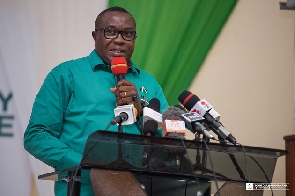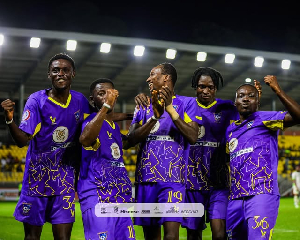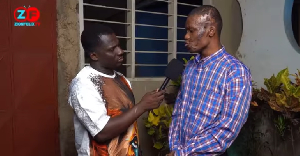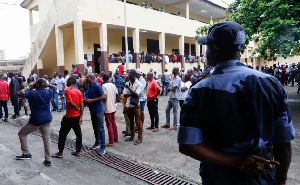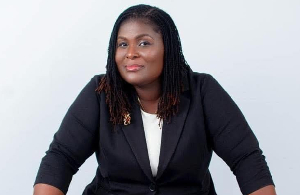The Accra High Court on Thursday admitted the controversial audio recording in the trial of Mr Samuel Ofosu-Ampofo and Mr Anthony Kwaku Boahen, Chairman and deputy communications director respectively of the opposition National Democratic Congress (NDC).
The Court presided over by Mr Samuel K. Asiedu said the defense had not objected to its admissibility and but the weight.
It has therefore adjourned the trial to March 12, 18 and 19 for the continuation of hearing.
The audio recording was an interview that transpired between Mr Benjamin Osei Ampofo Adjei, a broadcast journalist and the first Prosecution witness and Mr Boahen, Deputy Communication’s Director of the National Democratic Congress, the main opposition party.
In the recording, the witness asked Mr Boahen to comment on previous statements made by Mr Ofosu-Ampofo, NDC National Chairman advising it’s communication directors on security measures to be adopted on the Ayawaso Wuogon bye-elections.
Mr Tony Lithur, counsel for first accused (Mr Ofosu-Ampofo) did not object to the audio recording.
He said; “I do not object as the recording of the interview to an extent intended to authenticate statements made by a third party, especially, first accused (Ofosu-Ampofo).
“I reserve his right to object to such statements of first accused in that regard”.
However, Dr Aziz Bamba, counsel for Mr Boahen, objected with the reason that the audio incorporates certain statements allegedly made by Mr Ofosu-Ampofo and contained in what prosecution was seeking to tender in evidence.
“I do not object to the exchanges between Prosecution Witness One (PW1) and second accused person (Mr Boahen), the audio allegedly contain conversation between PW1 and second accused.
“When tendered, it will contain information about an alleged audio recording made in relation to first accused and that is a violation to Article 18 (2)” of 1992 Constitution.
The Article states that no person shall be subjected to interference of his home, property, communication, except in accordance with the law and as may be necessary in a free and democratic society for the protection of freedom and rights of citizens.
He said when one interfered with the communication and recording of another, it would be unconstitutional except certain conditions had been met, that is, interference must be in accordance with the law and as may be necessary in free and democratic society and the safety of economic wellbeing, prevention of crime.
Prosecution had no basis to have interfered and violating that Article and that the violator exposed himself to paying a compensation to the victim.
“No evidence had been taken in accordance with the law and the prosecution has not indicated any statute or law that empowers them or PW1 to interfere with the alleged communication of first accused on that basis to the extent that the alleged audio excluded the conditions,” he said.
He pleaded with the Court to expunge Mr Ofosu-Ampofo’s part from the recording.
Dr Bamba then urged the Court to refer the matter to the Supreme Court for interpretation of Article 130 (18).
He said the Prosecution had led no evidence warranting the making of the alleged audio statement.
Mr Asiamah Sampong, representing the state as part of the Prosecution rebutted the argument and said, Mr Ofosu-Ampofo’s part on the audio cannot be separated.
He said the Prosecution did not interfere because the recording bothered on criminal activity and that is not a violation.
Justice Asiedu ruled that the audio was the recording of the interview by the witness and once he said that was what went on, Section 51 and 52 of the Evidence Act becomes relevant thus, he overruled the objection.
Dr Bamba had objected to the audio being tendered after the evidence-in-chief of the first Prosecution witness, the Court objected and said witness statements came with all its exhibits.
It would be recalled that on January 31, 2019, a by-election was conducted at the Ayawaso West Wuogon Constituency as a result of the demise of its Member of Parliament.
Prosecution said there were disturbances in the course of the elections and on February 3, Mr Ofosu-Ampofo met the NDC party Communication Directors at its Headquarters located at Adabraka, a suburb of Accra.
According to the prosecution the meeting which was audio was recorded, was circulated later in a cross-section of the media and contains a set-up of a road-map of criminal activities targeted at the Chairperson of the Electoral Commission (EC) and the Chairman of the National Peace Council.
Prosecution said the tape was intercepted by the Criminal Investigation Department of the Police Service.
The Prosecution said Mr Ofosu-Ampofo on the audio also incited the communicators of the party to molest both the EC and Peace Council Chairpersons.
The prosecution said that the orchestrated electoral violence plot was going to be attributed to the New Patriotic Party, which is the ruling Party.
General News of Friday, 28 February 2020
Source: GNA

